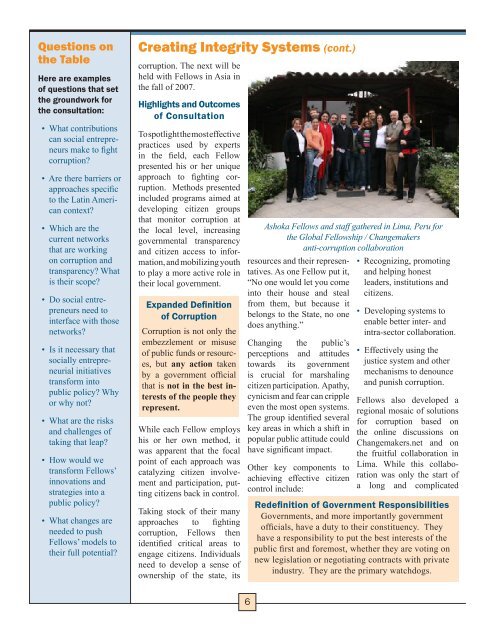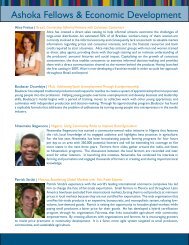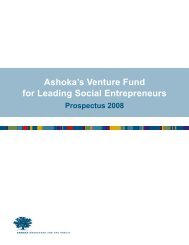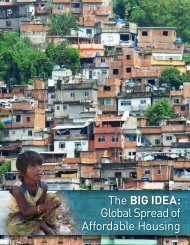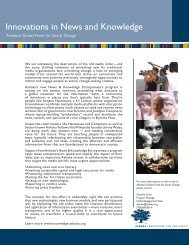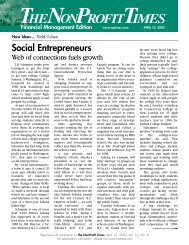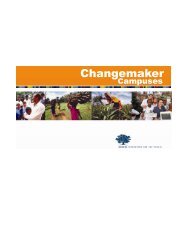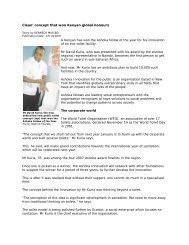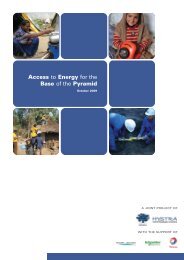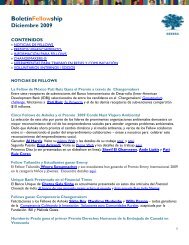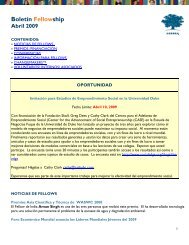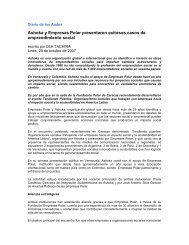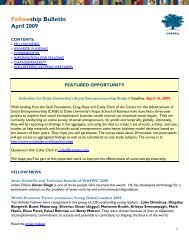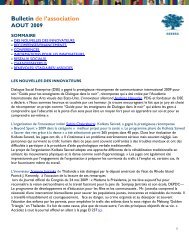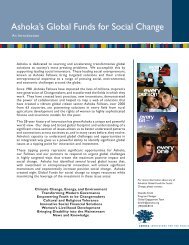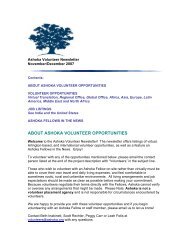cont. - Ashoka
cont. - Ashoka
cont. - Ashoka
You also want an ePaper? Increase the reach of your titles
YUMPU automatically turns print PDFs into web optimized ePapers that Google loves.
Questions on<br />
the Table<br />
Here are examples<br />
of questions that set<br />
the groundwork for<br />
the consultation:<br />
• What <strong>cont</strong>ributions<br />
can social entrepreneurs<br />
make to fight<br />
corruption?<br />
• Are there barriers or<br />
approaches specific<br />
to the Latin American<br />
<strong>cont</strong>ext?<br />
• Which are the<br />
current networks<br />
that are working<br />
on corruption and<br />
transparency? What<br />
is their scope?<br />
• Do social entrepreneurs<br />
need to<br />
interface with those<br />
networks?<br />
• Is it necessary that<br />
socially entrepreneurial<br />
initiatives<br />
transform into<br />
public policy? Why<br />
or why not?<br />
• What are the risks<br />
and challenges of<br />
taking that leap?<br />
• How would we<br />
transform Fellows’<br />
innovations and<br />
strategies into a<br />
public policy?<br />
• What changes are<br />
needed to push<br />
Fellows’ models to<br />
their full potential?<br />
Creating Integrity systems (<strong>cont</strong>.)<br />
corruption. The next will be<br />
held with Fellows in Asia in<br />
the fall of 2007.<br />
Highlights and Outcomes<br />
of Consultation<br />
To spotlight the most effective<br />
practices used by experts<br />
in the field, each Fellow<br />
presented his or her unique<br />
approach to fighting corruption.<br />
Methods presented<br />
included programs aimed at<br />
developing citizen groups<br />
that monitor corruption at<br />
the local level, increasing<br />
governmental transparency<br />
and citizen access to information,<br />
and mobilizing youth<br />
to play a more active role in<br />
their local government.<br />
Expanded Definition<br />
of Corruption<br />
Corruption is not only the<br />
embezzlement or misuse<br />
of public funds or resources,<br />
but any action taken<br />
by a government official<br />
that is not in the best interests<br />
of the people they<br />
represent.<br />
While each Fellow employs<br />
his or her own method, it<br />
was apparent that the focal<br />
point of each approach was<br />
catalyzing citizen involvement<br />
and participation, putting<br />
citizens back in <strong>cont</strong>rol.<br />
Taking stock of their many<br />
approaches to fighting<br />
corruption, Fellows then<br />
identified critical areas to<br />
engage citizens. Individuals<br />
need to develop a sense of<br />
ownership of the state, its<br />
<strong>Ashoka</strong> Fellows and staff gathered in Lima, Peru for<br />
the Global Fellowship / Changemakers<br />
anti-corruption collaboration<br />
resources and their representatives.<br />
As one Fellow put it,<br />
“No one would let you come<br />
into their house and steal<br />
from them, but because it<br />
belongs to the State, no one<br />
does anything.”<br />
Changing the public’s<br />
perceptions and attitudes<br />
towards its government<br />
is crucial for marshaling<br />
citizen participation. Apathy,<br />
cynicism and fear can cripple<br />
even the most open systems.<br />
The group identified several<br />
key areas in which a shift in<br />
popular public attitude could<br />
have significant impact.<br />
Other key components to<br />
achieving effective citizen<br />
<strong>cont</strong>rol include:<br />
• Recognizing, promoting<br />
and helping honest<br />
leaders, institutions and<br />
citizens.<br />
• Developing systems to<br />
enable better inter- and<br />
intra-sector collaboration.<br />
• Effectively using the<br />
justice system and other<br />
mechanisms to denounce<br />
and punish corruption.<br />
Fellows also developed a<br />
regional mosaic of solutions<br />
for corruption based on<br />
the online discussions on<br />
Changemakers.net and on<br />
the fruitful collaboration in<br />
Lima. While this collaboration<br />
was only the start of<br />
a long and complicated<br />
Redefinition of Government Responsibilities<br />
Governments, and more importantly government<br />
officials, have a duty to their constituency. They<br />
have a responsibility to put the best interests of the<br />
public first and foremost, whether they are voting on<br />
new legislation or negotiating <strong>cont</strong>racts with private<br />
industry. They are the primary watchdogs.


